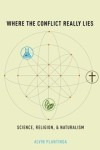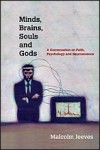As an American, I can readily find places where science and religion intersect. We're in the midst of a presidential election cycle where the influence of candidates' religious beliefs on their perspective of scientific topics is fodder for discussion, research from Pew and others on science and religion questions regularly makes headlines, and we have multiple museums dedicated to religiously motivated alternatives to mainstream science. The abundance of American voices can make it challenging to remember that America … [Read more...] about Science Corner: Science & Faith Around the World
science and religion
Book Review: The Language of God
The value of The Language of God: A Scientist Presents Evidence for Belief is that it was written by the Director of the Human Genome Project. Francis Collins'[1] personal narrative of coming to faith and his sometimes eloquent plea for an end to the warfare between science and faith are the most valuable parts of the book. These are the strengths of The Language of God and worth the price of admission if you have not heard his story. Likewise, Collins gives a good, if relatively brief, narrative of his work in … [Read more...] about Book Review: The Language of God
Book Review: Where the Conflict Really Lies
Most people think there is a basic antagonism between faith and science that has to be overcome if one is to be both a theist and a scientific practitioner. Alvin Plantinga [1] says, au contraire. It is in fact the naturalist who has the real problem. In Where the Conflict Really Lies: Science, Religion, and Naturalism, Plantinga carefully works this out over 352 pages. He begins with the areas often thought to be in contradiction, in particular the questions of evolution and miracles, and demonstrates that in … [Read more...] about Book Review: Where the Conflict Really Lies
Science and Faith: Navigating the Unwarranted Divide
Editor's note: Yesterday, Katelin reviewed Minds, Brains, Souls and Gods: A Conversation on Faith, Psychology and Neuroscience. Today she shares a few reflections stimulated by Minds, Brains, Souls and God: Science and Faith A God That is Bigger Than Our Own Understanding Our Dual Mission Field. As always, please do not hesitate to share your questions, insights, and musings with us. To God be the glory! ~ Thomas B. Grosh IV Science and Faith Too often scholars of faith find themselves caught … [Read more...] about Science and Faith: Navigating the Unwarranted Divide
Asking Jeeves
There is a pressing need for healthy dialogue regarding the psychology, and biology, of faith. Do humans have free will? What are the respective roles of the mind, the soul, and the brain? Are reports of supernatural experiences evidence for or against the existence of Heaven? Are we pre-conditioned to seek out a divine being? These are not questions from which Christians should not shy away. In fact, I'm convinced that by leaning into the discussion, our faith will be deepened and enriched. Dr. Malcolm Jeeves's … [Read more...] about Asking Jeeves



